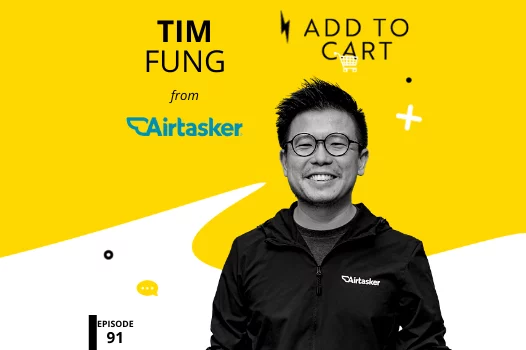In this episode of Add To Cart, we are joined by Tim Fung, founder of Airtasker, the community platform that connects people who need jobs done with people who want to work. Started in Australia in 2012, Airtasker now operates in New Zealand, Singapore, the UK, Ireland and the US and listed on the ASX earlier this year. In this chat, Tim shares how he got started with Airtasker and effectively scaled a two sided marketplace that now lists over 80,000 tasks every month. He gives us insights on how eCommerce skills are in demand and how some businesses are turning to Airtasker to fill skill gaps. And he reveals some of the most fascinating tasks that the platform has listed – including removing spiders from light fittings, entertaining drag queens and even Tim himself helping review your pitch deck.
“In one of the early months, I had a burn rate of $150,000 in a month and out of $1.4 million dollars, $150k is pretty scary“
Tim Fung
Questions answered in this episode include…
- How did Airtasker get started?
- How does Airtasker manage and organise such a huge amount of product to give users a great online experience?
- What is your top tip for an effective pitch deck?
All in from the ground up
Airtasker in particular is a business that is built on network effects and scale. And so it’s really hard to experiment. A lot of people will say, “Oh, the best way to see if a company is viable is throw up a landing page, chuck a couple of Google ads to it, spend $50 on Google and then see if there’s traction.” One of the problems with Airtasker in doing that is that if you have no taskers, then that’s not very interesting. Equally if you have no jobs, you can’t really find out whether service providers, taskers are going to want to do those jobs. So you can’t really take it by halves. And so it was a very challenging business to build, I would say.
The way we went about it, it’s really how do you take that sort of ambiguity and what’s the appropriate level to take a crack at it? And what we did is we had to build a team straight away. So we engaged a great group of engineers to help us build the platform. My co-founder Johno’s an engineer, but not a developer. And I went on the marketing and the business side. We put our own money in to be able to hire people and build a proof of concept. And then from there, we had to go to the capital raising trail.
And so we raised about $1.4 million just after we launched, which I think in the context of what you can do today, maybe that’s a lot of money. On the other hand when you’re staring down having to build a company and all the things that you have to do, it can feel like a very small amount of money. I remember in the early months, one of my months I had a burn rate of something like 150 grand in a month. And it was like, “Out of $1.4 million, 150 K is pretty scary on basically zero revenue,” because when you do the math, we were charging 15% of the task value, even if you’re doing $10,000 worth of tasks, it’s only 1500 bucks, doesn’t go very far. So it definitely was challenging because it’s built on scale and network effects.
Open and Infinitely Horizontal
One of the things I think that’s interesting about Airtasker is that we are an open and infinitely horizontal marketplace. And what we mean by that is first of all being an open marketplace means that rather than having operational staff, telling people what to do, we’ve built a system based on transparency and accountability. So you can come onto the Airtasker, you can start working, you can start building up your brand or reputation, and that’s what really drives great customer outcomes.
The second part is that we’re infinitely horizontal. So rather than having a specialist cleaning website, or even a website which has cleaning plus plumbing, plus electrical, we’re actually infinitely horizontal. So customers can really come into Airtasker and ask for anything that they need done within our community guidelines. And we empower our taskers to be able to solve that problem in any way that they see fit. And by doing this, we enable all of these service industries that couldn’t have existed before Airtasker.
And so examples of that, Ikea furniture assembly, we did millions of dollars of jobs in that industry last year, or maybe some of the more nichey ones like removing a spider from a light fitting, we did $70,000 worth of those jobs last year. And I guess what we really believe, I think somewhat uniquely is that, that long tail of all those things that people need done actually sums up to something that is absolutely enormous. And that’s why we have such high conviction on Airtasker being horizontal rather than a vertical or specialized kind of marketplace.
COVID, eCommerce & Airtasker
So there’s no doubt that e-commerce absolutely exploded and small businesses were clambering all over platforms and marketplaces like Airtasker to bring in that extra fire power that they needed during that period. I would say that it has been really interesting.
One of the things from COVID is that it’s a difficult macro environment to be hiring, it’s tough. If you’re an employer or you’re a person looking for help, those skills are in strong demand and there just ain’t the people to be able to do it. And we’ve certainly felt that in the Airtasker marketplace, looking for skills, but finding those people with skills, given that net migration is negative in Australia, you got more people leaving and you’ve got coming, has definitely caused a strain on being able to access those skills, which I think is what Airtasker is designed for.
So we can really be a part of solving that, but it’s a tough situation from a macro perspective.




